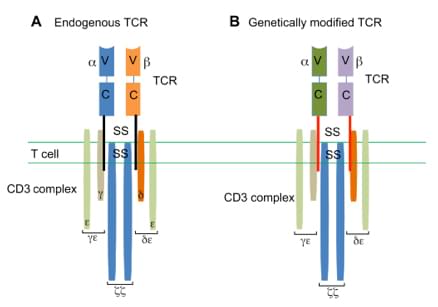
Altering the specificity of T cell receptor (TCR) is one of the popular strategies to genetically modify T cells for enhancing their tumor-killing activity. Creative Biolabs offers TCR-modified T cells construction services covering every unit, from epitope identification, TCR engineering to a series of validation assays.
T cells play a critical role in immunologic process. Hence, it is important to generate sufficient reactive T cells in the immunotherapies of many diseases. During cancer progression, immune system especially tumor-specific T cells may fail to eliminate cancer because of diverse reasons. The first class is intrinsic immune failure: (1) Tumor-specific T cells might be absent from the immune repertoire. The immune system is sculpted by the mechanisms of central and peripheral tolerance which make tumor-reactive T cells eliminated or only leave weakly tumor-reactive T cells. (2) Antigen-presenting cells (APCs) fail to present tumor-associated antigens in a form that is sufficiently antigenic for T cells, resulting in T cells can`t proliferate and persist in response to tumors. (3) Tumor-reactive immune cells do not localize to the tumor. (4) Regulatory T cells (CD4+CD25+FoxP3+) inhibit tumor-specific T-cell activity. Extrinsic immune evasion is another reason that is responsible for the failure of immune system to eliminate cancer. Tumors undergo a process of immunoediting during their development and growth. (1) Antigens, the peptide itself or combined with MHC molecules, might be down-regulated under immune-selection pressure. (2) Tumor cells or stromal elements can secret various factors to inhibit immune cells or bias the effector type produced. (3) Death-receptor pathways are down-regulated. Death receptors or their downstream signaling molecules might be mutated or lost entirely. So in order to induce effective immune responses, the effective immune response of specific T cells is the most important issue. There are two classical approaches to manipulate T-cell specificity: modification using TCR genes or modification using antibody genes. The former method usually refers to TCR-modified T cells. While the latter method utilizes genes encoding monoclonal antibody chains specific to tumor associated antigens. During the past decades, the strategy to modify T cells through altering the specificity of the TCR has made important advances. To construct TCR-modified T cells, genes encoding the α- and β-chains of TCR are isolated from T cells that are reactive to tumors and then transduce T cells or their precursors. Such TCR-modified T cells have been used in clinic and shown reactivity to tumor cells in vitro, induce antitumor effects in vivo. Based on the factors mentioned above, the T-cell genetic-modification strategies have also been expanded: tranducing T cells with a gene encoding a chimeric receptor that contains co-stimulatory domains; genes encoding growth factors, genes encoding chemokine receptors, suicide genes; transducing hematopoietic stem cells with TCRs; infecting T cells with retrovirus; using dual-specific T cells; using T cells as APCs; using anti-apoptotic strategies; transducing T cells with; inducing resistance to tumor-derived inhibitory factors, etc.
With advanced technologies and qualified groups, we can provide services for every client seeking for high-quality and cost-effective TCR-modified T cells solution for the scientific research. Our project manager teams can design and perform TCR-modified T cells construction to meet your request.
Reference
To discuss your demands or to request a proposal, please contact us by .
For any technical issues or product/service related questions, please leave your information below. Our team will contact you soon.
All products and services are For Research Use Only and CANNOT be used in the treatment or diagnosis of disease.
 NEWSLETTER
NEWSLETTER
The latest newsletter to introduce the latest breaking information, our site updates, field and other scientific news, important events, and insights from industry leaders
LEARN MORE NEWSLETTER NEW SOLUTION
NEW SOLUTION
CellRapeutics™ In Vivo Cell Engineering: One-stop in vivo T/B/NK cell and macrophage engineering services covering vectors construction to function verification.
LEARN MORE SOLUTION NOVEL TECHNOLOGY
NOVEL TECHNOLOGY
Silence™ CAR-T Cell: A novel platform to enhance CAR-T cell immunotherapy by combining RNAi technology to suppress genes that may impede CAR functionality.
LEARN MORE NOVEL TECHNOLOGY NEW SOLUTION
NEW SOLUTION
Canine CAR-T Therapy Development: From early target discovery, CAR design and construction, cell culture, and transfection, to in vitro and in vivo function validation.
LEARN MORE SOLUTION